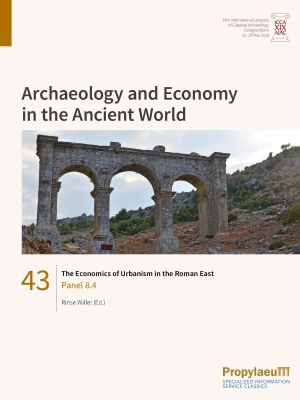Kloeg, Paul
The Economics of Urbanism in the Roman East: Panel 8.4
This volume discusses the geography of cities of the Eastern Mediterranean that existed under the Roman Empire. Roman urbanism has a long historiography, however, many previous studies saw the ancient town as an isolated historical phenomenon, or at best as an index of the spread of Hellenism or Romanitas. This volume attempts to take a step further and place the town in its socio-economic context, while also presenting the most up-to-date statistics for the urban phenomenon in the Roman East. Six contributions all deal with issues related to the spatial patterns observed in the distribution of cities in the eastern half of the Empire. One contribution, by way of comparison, deals with Roman urbanism of the Iberian Peninsula. Starting off with an overview of the Eastern Mediterranean as a whole, each contribution zooms in on a specific region in order to investigate the factors that shaped the pattern of urban settlement and the variation of city size on both (supra)regional and local scales. These factors are wide-ranging, from climatological variation, possibilities of connectivity through the road-network and sea-lanes, historical path-dependency, and agricultural potential to specific policies of Roman imperialism.







